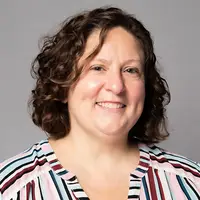With World Environment Day just behind us, and World Oceans Day just around the corner, RTI’s Jamie Pero Parker, from the Innovation Advisors team, will join a panel of representatives in solid waste management, research, advocacy and industry, to present and discuss innovative technologies and practices, research, public-private partnerships, and financing opportunities that seek practical responses to mitigate marine plastics pollution. The discussion, hosted by the Society of International Development – United States (SID-US), will center on the following important questions:
- Is there a solid waste management value chain for consideration?
- Where are the priorities and opportunities for more innovation in the solid waste management process?
- What investments are needed to scale innovations?
In the lead-up to that important conversation, we sat down with Jamie to get her expert take on a few questions surrounding this pertinent topic!
Following RTI Innovation Advisors’ participation at the Circularity 2022 event, what are exciting opportunities you’ve encountered – by private sector, government and non-government organizations - for really raising the bar in circular economy that also in the long-run would mitigate ocean plastics pollution?
JP: The most exciting opportunity is the global understanding that we can’t continue to live the way we have been living. Truly, across all sectors (industry, government, academia, and everyday citizens), there is growing awareness of the magnitude of this problem and this nasty habit we have codified into our behaviors of buy, consume, dispose, and repeat. I was also incredibly pleased that the unintended consequences of sustainability investments was a hot topic. My colleague, Edgard Ngaboyamahina, prepared a talk on how, sometimes, when we make progress in the name of circularity we inadvertently hurt some communities. I was delighted that this resonated with several leading companies, and they want to proactively consider this. We are also seeing a realization that much of the work needed to change the plastic ocean challenge is going to happen via consortiums. It makes sense as this is a systems challenge which is particularly difficult to solve.
How is your daily work contributing to a reduction in ocean plastics pollution and establishing a more circular economy?
JP: We are working at the front-end of solving this challenge. Most of our work is around helping companies make decisions about which sustainable options to adopt, and how to find the right technologies to either replace their existing packaging or create a more circular path after the product has been used by consumers. We are also supporting several of the consortiums playing in the space. The work here is really focused on uncovering the data needed to make informed decisions. Some of my career highlights have happened in the last three years. Nothing compares to seeing a press release about a company that has moved to a more sustainable packaging technology and knowing that behind the scenes, you were part of the team that brought that technology to them.
Considering all the players invested in producing, regulating, recycling, and reusing plastics, what are key areas for collaboration and focus for really limiting ocean plastics pollution?
JP: One of the points that I have been contemplating lately is that with recycling and packaging we essentially have a double systems challenge. First, recycling and systems designed to deal with plastic waste are outdated and inefficient. They didn’t develop on par with the rapid changes in packaging. You couple this with the fact that packaging has been developed traditionally, assuming a linear life cycle where the consumer disposes of the packaging after a single use. We have two separate systems that haven’t developed in an aligned fashion. One of the big efforts that we also look at is how to align those two systems. We need cross-collaboration among the players in waste and the players in product development.
What are you most optimistic about for the future?
JP: I frame my work through my role as a mother. We have so many different mounting environmental crises that we are leaving for our children. I realize that one day my daughter is going to be living in this world without me, and I want it to be better for her. I really believe that this realization is not unique to me—I’m seeing it as I do this work. I’m optimistic because for the first time in my 14 years at RTI I can feel the awakening that we have to fix our environmental crises now. We can’t punt this to the next generation. We can’t wait any longer. I know from my focus on innovation that, historically, when we reach this point of awareness, we always find a solution. The true challenge is getting to the first step which is consensus that we have to change. Once we get here we will find a technical and systems solution. So I think we have fought through one of the hardest parts to solving this already. I’m not saying that we have it solved and there aren’t challenges ahead, but in the current environment we live in, when you can build consensus that you must solve a challenge, it’s a major step forward.
